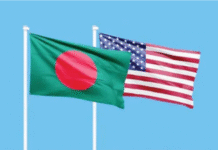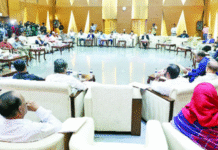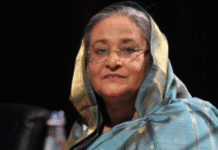Old issues frustrate people’s aspirations
 What is acclaimed as Bangladesh’s economic development is being dampened by widening disparity and lack of democratic governance – the issues that, economists recall, once prompted the nation’s independence struggle.
What is acclaimed as Bangladesh’s economic development is being dampened by widening disparity and lack of democratic governance – the issues that, economists recall, once prompted the nation’s independence struggle.
Rather, they observe, the country’s policymakers seem to be obsessed with pre-independence philosophy ‘growth first, distribution later’, failing to recognise that development must go hand in hand with democracy for the sake of maximum public welfare.
Furthermore, economist Sajjad Zohir sees loss of control over the basic resources of the country and warns that higher growth may not benefit the people and the nation may suffer for low quality human resources.
One who was a youth during the 1971 liberation war, he emphasises “aspirations of a residing citizen in Bangladesh – a sovereign land where I would like to see unhindered human creativity and inclusive development flourish.”
Four decades later, the most talked about economic goal on the political front has been the objective of attaining the status of middle income country calculated on the basis of per capita gross national income.
“The middle income dream was initially an aspirational agenda but increasingly we have to ask whether it is any longer an inclusive dream. Middle income is not merely about GDP statistics. It is more importantly about quality of life and about dignity in social and institutional life,” former caretaker government adviser Hossain Zillur Rahman argued.
More concerned about “an existential crisis about growing absence of accountability in all spheres of national life”, the economist cautioned that such a situation “is impacting on economic life too as evident in job crisis, corruption, brain drain and stagnation in private investment.”
Likewise, inequality, unemployment and lack of good governance remain a cause for concern for the nation, a former minister and key ally of the ruling party, Rashed Khan Menon, told parliament recently.
In an interview with Prothom Alo, he reiterated his point saying the wealth of the country’s 5 per cent rich people increased by 121 times when the resources of the poorest five per cent have come down to less 1 per cent.
The growth of the super rich, taking advantage of weak governance in the financial sector and rampant corruption in project implementation, has led to deeper income inequality, according to economist Atiur Rahman.

“One needs to be concerned about the growing disparity in an independent Bangladesh,” Atiur, who served as central bank governor during the Awami League regime, said when asked how he would explain the disparity, jobs crisis, and governance problems in the light of pre-1971 issues.
‘Equality, human dignity and social justice’ – spirits that are enshrined in proclamation of independence by the Mujibnagar government in April 1971 – contrast the current mode of governance and the state of freedom for citizens.
Bangladesh has this year slipped down to 149th position in corruption index prepared by Transparency International and in World Press Freedom Index 2018, the country was ranked 146th in among 180 countries, the worst performer among the South Asian nations.
Salehuddin Ahmed, who was Bangladesh Bank governor during the BNP and caretaker governments, pointed out that the Mujibnagar declaration had two parts – political freedom and economic emancipation.
“The subsequent activities in Bangladesh after independence do not prove that we have been very successful in pursuing the goals of governance and development in harmony,” he observed.
The analyst added, the Pakistan days’ philosophy “growth first, distribution later” still seems haunting the “policymakers who do not realise the fact that democracy and development should go hand in hand”.
History says cultural and economic discrimination, injustice to people of East Pakistan (now Bangladesh), absence of pluralist democracy, lack of decentralisation of power, suppression of freedom of conscience and the people’s quest for independent nationhood were the factors that led to the struggle for independence.
“The aspirations for democratic rights and social justice still remain unfulfilled due to deficiency in electoral system, corruption and intolerance,” Imtiaz Ahmed, a professor of international relations at Dhaka University, said in an interview with Prothom Alo.
Sajjad Zohir, executive director at Economic Research Group, mentioned that the state-level discrimination during the Pakistan days was in a way contributing to building the next generation, who fought for independent Bangladesh.
Today, he thinks, the crisis is elsewhere. “If the economic growth is spurred by investment and its profit is repatriated to other countries, for whom is this growth then?” he explained, and also expressed concern about the excessive burden of debt for the current and future generations.
Dwelling on the state of inequality, Atiur Rahman said, “The state patronage for highly connected so-called high-flying entrepreneurs could be one area where one can put more focus.”
He, however, noted that there are many hard working emerging entrepreneurs and many small and medium enterprises are thriving despite pretty unhealthy governance structures.









